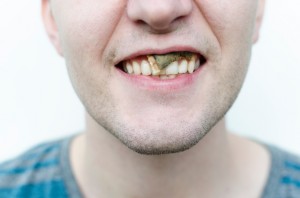 Tobacco use is rampant in the United States. Roughly 42 million people are habitual tobacco users. Of this number, many will develop conditions such as lung cancer, emphysema and more. Tobacco is enjoyed by people in several different ways including cigarettes, smokeless tobacco (“dip”), or cigars. Nicotine is highly addictive, which explains why so many people are tobacco users. We’re here to tell you that it’s in your best interest to kick the habit while you still have time. You see, it isn’t just your overall health you’re putting at risk, it’s your oral health, too. Our Beachwood, OH office wants you to know that your oral health is very important and tobacco use can leave it in bad shape. Bad oral health has a major impact on your overall health. As the Beachwood dentist of choice for residents in the area, Dr. Hornstein has firsthand the effects tobacco has had on many patients. He and the rest of our dental staff want you to live your life free of tobacco and with the best oral health of your life.
Tobacco use is rampant in the United States. Roughly 42 million people are habitual tobacco users. Of this number, many will develop conditions such as lung cancer, emphysema and more. Tobacco is enjoyed by people in several different ways including cigarettes, smokeless tobacco (“dip”), or cigars. Nicotine is highly addictive, which explains why so many people are tobacco users. We’re here to tell you that it’s in your best interest to kick the habit while you still have time. You see, it isn’t just your overall health you’re putting at risk, it’s your oral health, too. Our Beachwood, OH office wants you to know that your oral health is very important and tobacco use can leave it in bad shape. Bad oral health has a major impact on your overall health. As the Beachwood dentist of choice for residents in the area, Dr. Hornstein has firsthand the effects tobacco has had on many patients. He and the rest of our dental staff want you to live your life free of tobacco and with the best oral health of your life.
(more…)
The Dentist Pepper Pike Prefers Says Tobacco Use Greatly Affects Oral Health
September 16, 2015
Oral Health & Pregnancy Facts from Your Beachwood Dentist
July 15, 2015
 It’s no secret that your body changes when you’re pregnant. Hormones rising and falling, morning sickness, aches and pains, and more can make you feel like your body is out of control. Many patients aren’t aware of how hormonal variation during pregnancy can effect oral health. At the Center for Advanced Dentistry (CFAD), our skilled team will explain the ins and outs of the changes in your oral health while pregnant. If you are pregnant or trying to get pregnant, call to schedule an appointment at our Beachwood, OH office to review oral health and discuss recommended changes to your hygiene routine.
It’s no secret that your body changes when you’re pregnant. Hormones rising and falling, morning sickness, aches and pains, and more can make you feel like your body is out of control. Many patients aren’t aware of how hormonal variation during pregnancy can effect oral health. At the Center for Advanced Dentistry (CFAD), our skilled team will explain the ins and outs of the changes in your oral health while pregnant. If you are pregnant or trying to get pregnant, call to schedule an appointment at our Beachwood, OH office to review oral health and discuss recommended changes to your hygiene routine.
Oral Health Changes While Pregnant
The change in hormone levels puts women at high risk for gum disease, specifically a form of gingivitis referred to as “pregnancy gingivitis.” Thorough at home hygiene and regular six month dental cleaning may not be enough to prevent this form of gingivitis. If you notice inflamed, bleeding or swollen gums, gum sensitivity when eating or drinking, or excessive bleeding when flossing or brushing your teeth, call CFAD immediately. Depending on the severity, we may recommend more frequent cleanings through the course of your pregnancy. Gum disease during pregnancy increases the risk of pre-term birth and underweight babies as well as potentially compromising the baby’s and your immune system if infection enters the blood stream.
Another oral health change noticed while pregnant is the “pregnancy tumor.” The name is quite misleading. A pregnancy tumor is not cancerous. The changes in your body make the mouth’s soft tissue more sensitive to irritation from plaque buildup or foreign debris. These red lumps usually appear on the gums between teeth. If they are extremely painful or impede eating, we may recommend removal, but the tumors typically clear up on their own after you give birth.
Dental Care for Baby from the Dentist Shaker Heights Trusts Most
Did you know your baby’s teeth begin to develop between the 3rd and 6th month of your pregnancy? A healthy diet is essential to a healthy pregnancy, but did you know that eating well can help your baby develop stronger, healthier primary teeth? Your baby needs a lot of vitamins and minerals throughout the pregnancy, but their developing teeth especially need large amounts of Vitamins A, C and D, calcium, protein and phosphorous. Taking a prenatal vitamin as prescribed or recommended by your physician can help you absorb a large percentage of these necessary nutrients, but eating high fiber and protein, and calcium rich foods will provide your baby with more of the necessary nutrients for growth, especially for developing healthy teeth.
Most necessary dental health care is perfectly safe for pregnant and lactating mothers. However, elective procedures should be postponed until after your pregnancy. In the case of dental emergency, more complex restorative procedures may be necessary, but should always be performed in conjunction with your physician.
Contact Your Family Dentist, 44122
At the Center for Advanced Dentistry, we are here to care for you at every stage of your life. If you’re pregnant or trying to become pregnant, call to schedule an appointment to discuss tips for optimal oral hygiene while pregnant. Our Beachwood, OH practice welcomes patients from the surrounding area Shaker Heights, Pepper Pike, Warrensville Heights, Cleveland, and the neighboring communities
Oral Health and Heart Disease
August 3, 2010
The following link is to a video from Health Day TV. It shows the results of a study following patients for 8 years and compares the rate of teeth brushing against the incidence of cardiac problems. Taking the time to brush has benefits beyond fresh breath.
Heart Disease and Gum Health
May 10, 2010
I’ve had a number of patients say to me, “Doctor, my dentist says I should get my heart checked out, what does a dentist know about hearts?” Then after some tests, I have to tell my patients, that, yes, their dentist was right, they have a heart problem. There is definitely a gum-heart connection and that connection is inflammation. Untreated chronic inflammation can lead to severe health complications.
This is how it happens. When you consume anything, residue collects on your teeth, and this residue forms plaque. Plaque is a sticky deposit of mucus, food particles and bacteria formed at the base of your teeth within hours of eating. If you don’t remove the plaque it can cause gingivitis, the collection of plaque in pockets between swollen gums and the base of your teeth.
Gingivitis is also the source of bad breath. Left untreated, gingivitis can lead to periodontal disease; also know as gum disease. Your mouth has the highest concentration of bacteria in your body under normal conditions, but if you have gum disease, the bacteria count gets even higher. Inflamed gums present a good portal for bacteria to enter your bloodstream and move on to your heart. There it can damage your heart walls or values. It might also provoke blood-clotting, leading to stroke or a heart attack.
The Good News is – You Can Stop Gum Disease At Your Bathroom Sink
Sadly, gum disease is one of the easiest preventable diseases out there. Yet some 50 percent of the adult population has gum problems. Good dental hygiene can eliminate or slow gum disease and all it takes is making a conscious effort to brushing your teeth after every meal and flossing before you go to bed.
Here are the steps recommended by the American Dental Association
Brushing Your Teeth
- Place your toothbrush at a 45-degree angle against the gums.
- Move the brush back and forth gently in short (tooth-wide) strokes.
- Brush the outer tooth surfaces, the inner tooth surfaces, and the chewing surfaces of the teeth.
- Use the “toe” of the brush to clean the inside surfaces of the front teeth, using a gentle up-and-down stroke.
- Brush your tongue to remove bacteria and freshen your breath.
Flossing Your Teeth
- Break off about 18 inches of floss and wind most of it around one of your middle fingers. Wind the remaining floss around the same finger of the opposite hand. This finger will take up the floss as it becomes dirty. Hold the floss tightly between your thumbs and forefingers.
- Guide the floss between your teeth using a gentle rubbing motion. Never snap the floss into the gums.
- When the floss reaches the gum line, curve it into a C shape against one tooth. Gently slide it into the space between the gum and the tooth.
- Hold the floss tightly against the tooth. Gently rub the side of the tooth, moving the floss away from the gum with up and down motions.
- Repeat this method on the rest of your teeth. Don’t forget the back side of your last tooth.
Nutrients for a Healthy Smile
Nutrition plays an important role in gum health. Crunchy fruit and vegetables can actually clean your teeth as you are eating, and the acid delays the formation of plaque. Vitamins A, C, D, E and K and the B vitamins; folic acid; biotin; choline; calcium; zinc; and magnesium have all been found important for your oral health.
According to Aim International, two studies suggest that coenzyme Q10 and aloe are also helpful to gum health:
Two dietary supplements, coenzyme Q10 and aloe vera, are helpful to gum health. Coenzyme Q10 (CoQ10) may help with periodontal pocket depth. In early research, Dr. Edward G. Wilkinson, of the U.S. AirForce Medical Center, gave patients 50 mg of CoQ10 a day. His patients experienced reduced periodontal pocket depth. Wilkinson said, “Treatment of periodontitis with coenzyme Q10 should be considered as an adjunctive treatment with current dental practice.” Later studies have reconfirmed this. Hanioka, et al., say “These results suggest that the topical application of CoQ10 improves adult periodontitis” (Molecular Aspects of Medicine. 1994. 15 Suppl)
Aloe vera is known to kill bacteria. Dr. Eugene R. Zimmerman and Dr. Ruth A. Sims have (Aloe Vera of America Archives, Stabilized Aloe Vera, Vol. I) noted that aloe does have bactericidal properties. This means it may be useful in periodontal disease, which is a bacterial infection. Simply rub the liquid or gel on the gums.
When you take care of your gums and teeth, you are helping yourself on many levels. Superficially, you will retain your beautiful, white-toothed, smile. Your breath will smell sweet. Moreover, your heart and arteries will have an added protection against the onslaught of bacteria.
Mark Rosenberg, M.D.
Institute For Healthy Aging
http://www.vitalmaxvitamins.com
